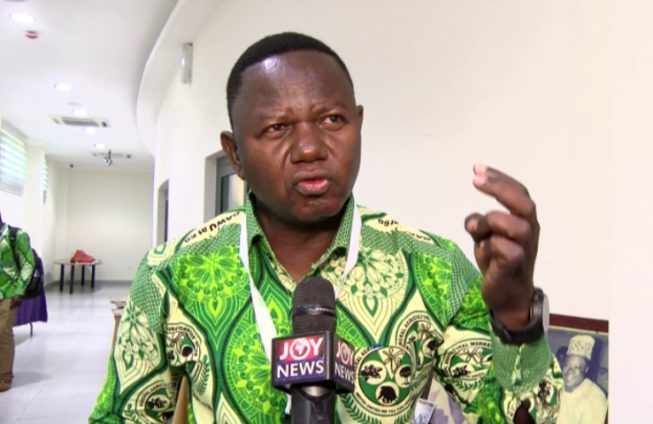The General Agricultural Workers' Union (GAWU) wants government to implement the Obaatanpa policy surgically, to the target group and on time in order to achieve its full objectives.
One of the cardinal focus of the policy is to attract educated youth into agriculture. GAWU says though the policy is a brilliant one, the agriculture sector can only benefit if a market is created for food production, whilst challenges minimized drastically.
Edward Kareweh, the General Secretary holds that there should be some arrangements to move the produce from the farm to the consumer.
“We must build strong linkages between the production and the market which should not be the concern of the youth, the young men and women who would be in agriculture that should not be their concern. Their concern should be to produce.
When you produce there is an arrangement that will allow your produce to be taken off your farm without you now going to look for a marketer to come and take it from you and that will be a good inducement,” he said.
According to him, this is to assure farmers of their money.
“This can guarantee that they will not lose their capital at the end of production and their effort and the denial and the discomfort that they will go through will not come to waste at the end of production when they fail to get market.” he added.
About Obaatanpa Programme
The Ghana CARES (Obaatan pa) programme is an unprecedented, bold and audacious GHȻ100 billion post COVID programme to stabilize, revitalize and transform Ghana’s economy to create jobs and prosperity for Ghanaians over a three-year period.
It is sequenced in two phases: a Stabilization Phase that is running from July to the end of the year (2020); and a medium-term Revitalization Phase from 2021-2023.
The first phase of the programme builds on the actions already taken by Government under the Coronavirus Alleviation Programme, including stabilization of the economy, ensuring food security, support businesses and workers, strengthening the health system and passage of legislations to facilitate quick economic recovery.
The second phase aims at revitalizing and transforming the economy from 2021-2023 will focus on supporting commercial farming and attracting educated youth into agriculture, building Ghana’s light manufacturing sector, developing engineering/machine tools and ICT/digital economy, developing Ghana’s housing and construction industry, reviewing and optimizing the implementation of Government flagships and key programmes among others.
Latest Stories
-
George Twum-Barimah-Adu pledges inclusive cabinet with Minority and Majority leaders
23 mins -
Labourer jailed 5 years for inflicting cutlass wounds on businessman
23 mins -
Parliament urged to fast-track passage of Road Traffic Amendment Bill
24 mins -
Mr Daniel Kofi Asante aka Electrician
24 mins -
Minerals Commission, Solidaridad unveils forum to tackle child labour in mining sector
30 mins -
Election 2024: Engagement with security services productive – NDC
31 mins -
Retain NPP for the good of Ghana – Rebecca Akufo-Addo
31 mins -
‘Let’s work together to improve sanitation, promote health outcome’ – Sector Minister urges
32 mins -
Ellembelle MP cuts sod for six-unit classroom block at Nkroful Agric SHS
35 mins -
‘I’ll beat the hell out of you if you misbehave on December 7’ – Achiase Commanding Officer
38 mins -
AFPNC leads the charge on World Prematurity Day 2024
44 mins -
Court remands unemployed man over theft of ECG property
50 mins -
Election security rests solely with the police – Central Regional Police Command
52 mins -
NCCE engages political youth activists at Kumbungu on tolerance
52 mins -
‘In Mahama’s era students lacked chalk, but are now receiving tablets’ – Bawumia
1 hour

